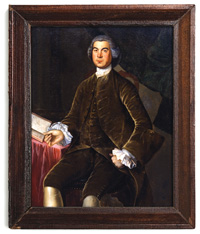“They Stole many things & plunder’d my Store”
 John Rowe reported that Monday, 11 Mar 1776, brought “Gloomy heavy Weather,” and his mood wasn’t any better.
John Rowe reported that Monday, 11 Mar 1776, brought “Gloomy heavy Weather,” and his mood wasn’t any better.
The day before, as quoted yesterday, Gen. William Howe issued a proclamation requiring everyone with “Linnen and Woolen Goods” to turn them over to the evacuating army lest they fall into Continental hands.
That proclamation promised that the New York merchant Crean Brush (shown here) “will give a Certificate of the Delivery, and will oblige himself to return them to the Owners.” But if people didn’t comply, they risked being treated as rebel sympathizers.
Rowe appears to have been surprised that this proclamation applied to him, too. His 11 March diary entry says:
This morning I Rose very Early and very Luckily went to my WarehouseIn May 1776, Austin, Scollay, Partridge, Dashwood, and Rowe petitioned the Continental Congress to speak up for them about their confiscated goods. But there was a war on.
when I Came there I found Mr. Crian Brush with an Order & party from the Genl. who were just going to Break Open the Warehouse which I prevented by Sending for the Keys & Opening the Doors—
They took from Mee to the Value of Twenty Two hundred & Sixty Pounds Sterling According to the best Calculation I Could make in Linnens Checks Cloths & Woollens—
This Party behaved very Insolently & with Great Rapacity & I am very well Convinc’d exceeding their orders to a Great Degree They Stole many things & plunder’d my Store. Words cannot Describe it
This Party consisted of Mr. Blasswitch who was one of the Canceaux people [i.e., an officer on H.M.S. Canceaux] Mr. Brush the Provost Mr. [William] Cunningham A Refugee Mr. [James or Peter] Welch The Provost Deputy—A Man nam’d [William] Hill & abo. fifteen Soldiers—with others—
I Remained all Day in the store but Could not hinder their Destruction of my Goods This day I Got a piece of Bread & one Draft of Flip
I Spent the Evening at home with Mr. [Samuel] Parker Rich’d Green Mr. [Jonathan] Warner of Portsmouth who assisted Mee very much with Mrs. Rowe & Jack Rowe
They are making the Utmost Speed to get away & carrying Ammunition Cannon & every thing they Can away taking all things they meet with never asking who is Owner or whose Property making havock in Every house & Destruction of All kinds of Furniture—
There never was Such Destruction & Outrage committed any day before this Many other People have suffer’d the Same Fate as Mee— Particularly—
Mr. Saml. Austin Mr. John Scolly Capt. [Samuel] Partridge Capt. [Samuel] Dashwood Mr. Cyrus Baldwin The Widow [Mary] Newman
Nine years later, in 1785, Rowe, Partridge, Dashwood, and Austin sought help from Gov. James Bowdoin and American minister John Adams in gaining redress from Britain. (I don’t know why Scollay dropped out; he was still alive at the time.)
Responding to a similar claim from Dr. Thomas Bulfinch, Adams wrote back on 13 Oct 1786:
I have not yet presented any of these Claims at Court, because there is not even a Possibility of their being regarded— . . . I frankly own I do not think, that the Dignity or the faith of the United States ought ever to have been compromised in these Matters—If those Boston merchants had left with the British military, they might have regained their property after landing in Halifax. But they did, after all, show themselves to be rebel sympathizers.
TOMORROW: A receipt, and more disorder.






